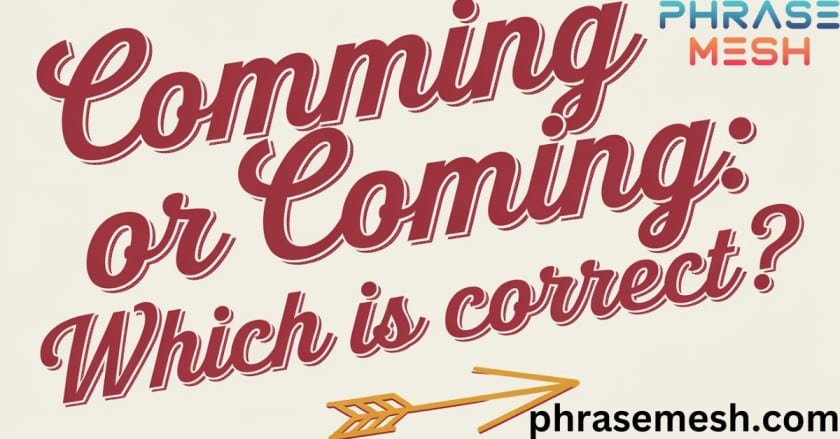A comprehensive exploration of spelling, usage, and linguistic nuances surrounding the word “coming”. This guide delves into correct orthography and practical application in various contexts. Readers will gain clarity on a frequently misunderstood term.
The Correct Spelling: Coming
A fundamental examination of the proper spelling of “coming”. Understanding the correct form is crucial for effective communication. This section breaks down the linguistic principles behind accurate word usage.
In the English language, spelling can be a tricky landscape to navigate. One of the most commonly misspelled words that frequently causes confusion is the word “coming.” Let’s dive deep into the correct spelling, usage, and nuances of this word.
Correct spelling matters immensely in professional and personal communication. The proper writing of the word is “coming” – with a single “m” – not “comming” with double “m”s.
Why “Coming” is Correct
An in-depth analysis of the grammatical reasoning behind the spelling. Exploring the word’s linguistic structure and grammatical function. Providing clear explanations for language learners and writers.
The word “coming” is the present participle of the verb “to come.” In continuous tenses, it describes an ongoing action or future event. This verb follows standard spelling rules in the English language.
Scenarios Demonstrating “Coming”
Real-world examples showcasing the correct usage of “coming”. Practical illustrations across different communication contexts. Demonstrating the word’s versatility in professional and personal settings.
Professional Email Example
Subject: Project Update Coming Soon Dear Sarah Thompson, I wanted to inform you that our quarterly report is coming soon.
The comprehensive analysis will be in your inbox by Friday afternoon.
Best regards,
Michael Rodriguez
Personal Text Message
“Hey Emma, I’m coming home after work. Want me to pick up dinner?”
Event Invitation
“Coming weekend, we’re hosting our annual charity fundraiser. Join us for an amazing cause!”
Common Mistakes to Avoid
A comprehensive guide to spelling errors and misconceptions. Highlighting frequent mistakes made by writers and language learners. Providing clear guidance on avoiding common pitfalls.
Incorrect Spelling Variations
- “Comming” (incorrect)
- “Comeing” (incorrect)
- “Commming” (incorrect)
Linguistic Breakdown
An analytical look at the word’s grammatical function and linguistic significance. Exploring the multiple contexts and meanings of “coming”. Breaking down its role in verbal communication.
In verbal communication, “coming” serves multiple purposes:
- Indicating movement towards a location
- Describing an approaching event
- Expressing future action
Contextual Usage Examples
Diverse scenarios illustrating the word’s application in different settings. Showcasing the flexibility and range of the term “coming”. Providing context-rich examples for comprehensive understanding.
Professional Contexts
- “The coming year looks promising for our department.”
- “We’re coming clean about our latest research findings.”
Personal Contexts
- “She’s coming of age next month.”
- “They’re coming weekend plans include a hiking trip.”
Why Spelling Matters
An exploration of the importance of correct spelling in communication. Understanding the broader implications of linguistic accuracy. Highlighting the significance of precise language use.
Accurate spelling reflects:
- Linguistic professionalism
- Communication clarity
- Personal attention to detail
Tips to Remember the Correct Spelling
Practical strategies for mastering the correct spelling of “coming”. Actionable advice for improving linguistic precision. Techniques to reinforce correct word usage.
- Remember: Single “m” after “com”
- Visualize the word’s structure
- Practice writing it correctly
- Use spell-check tools
- Read extensively to reinforce correct spelling
final thoughts:
In conclusion, the correct spelling is “coming,” while “comming” is a common mistake. The rule is simple: drop the “e” from “come” and add “-ing” without doubling the “m.” Understanding this rule helps avoid errors and keeps your writing clear.
Using correct spelling shows attention to detail and makes a good impression. Practice writing “coming” correctly to build confidence. Remember, “comming” is always incorrect. Stick to “coming” for proper and professional communication in all your writing.
FAQs on “Comming or Coming: Which Is Correct?”
1. What is the correct spelling: “comming” or “coming”?
The correct spelling is “coming.” Adding an extra “m” (comming) is a common typo but not grammatically correct. Always use “coming” to sound professional and accurate.
2. Why do people mistakenly write “comming”?
It happens because doubling consonants is a common spelling rule in some words, but not here. “Come” drops the “e” and simply adds “-ing” without doubling the “m.”
3. When should I use the word “coming”?
Use “coming” when referring to something approaching or happening soon. For example, “The coming storm” or “I’m coming to the party.”
4. Is “comming” ever acceptable in any context?
No, “comming” is never correct in standard English. Stick to “coming” to ensure your writing is error-free and clear.
5. How can I avoid the “comming” typo in my writing?
Double-check your spelling when writing “coming” and rely on spell-check tools. Practice spelling it correctly to develop a habit of avoiding the error.





